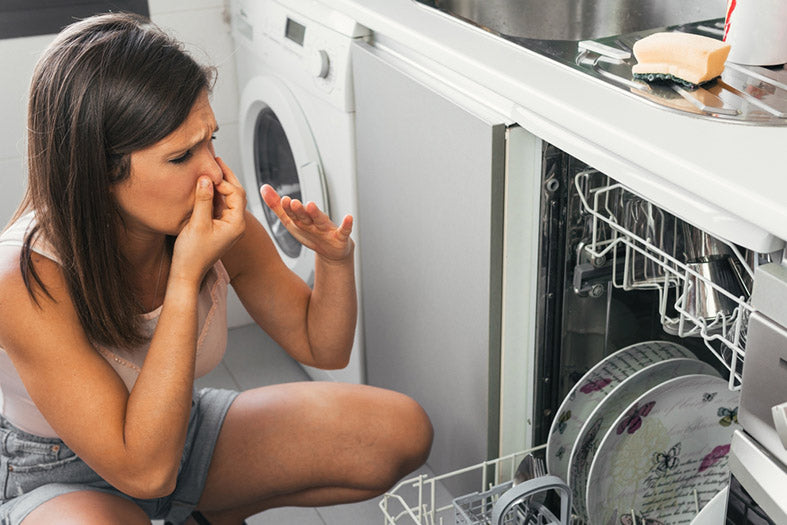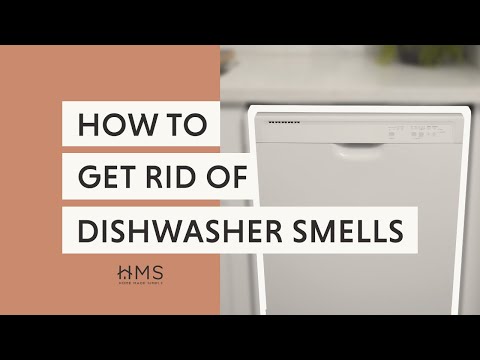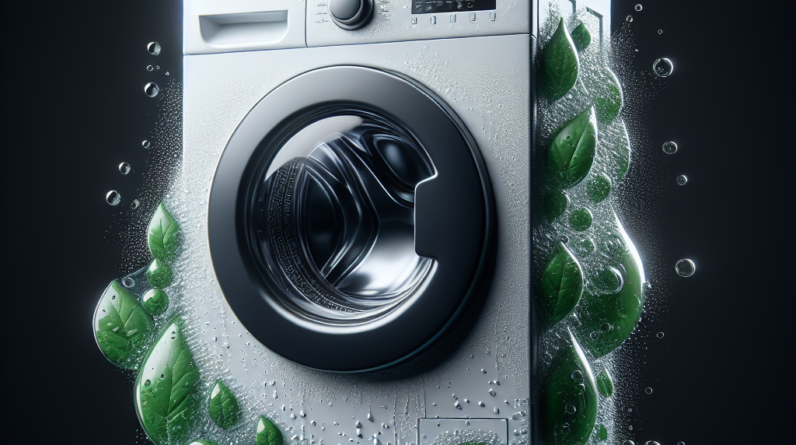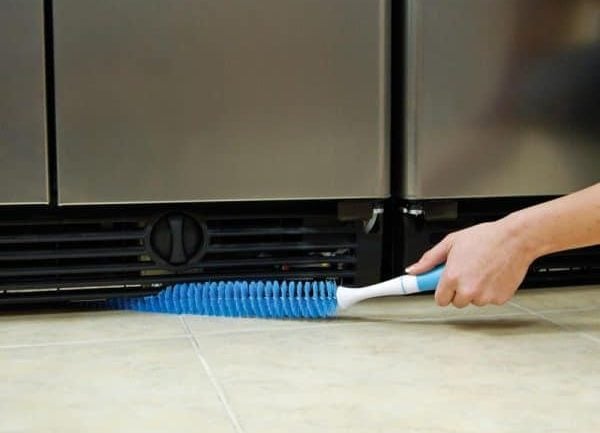
Are you tired of opening your dishwasher and being hit with an unpleasant smell? Whether it’s a lingering odor of stale food or a foul scent that seems impossible to get rid of, we’ve got you covered. In this guide, we will take you through some easy troubleshooting steps to eliminate those smelly or foul odors in your dishwasher. Say goodbye to unpleasant surprises when unloading your clean dishes and hello to a fresh and clean dishwasher every time.

This image is property of cdn.shopify.com.
1. Understanding the Causes of Dishwasher Odors
1.1 Food Residue Build-up
One of the most common causes of dishwasher odors is the build-up of food residue. Over time, small bits of food can accumulate in the filter, spray arms, and other parts of the dishwasher. These food particles can begin to decompose, causing unpleasant smells to emanate from your appliance.
1.2 Hard Water Deposits
Hard water, which contains high levels of minerals like calcium and magnesium, can leave deposits on the interior surfaces of your dishwasher. These deposits can create a breeding ground for bacteria and other odor-causing microorganisms. If you notice a musty or metallic smell coming from your dishwasher, hard water deposits may be the culprit.
1.3 Mold and Mildew Growth
Damp environments provide the perfect conditions for mold and mildew to thrive. If your dishwasher is not properly dried after each use, moisture can accumulate and create an environment where mold and mildew can grow. These fungi can produce a strong, unpleasant odor that can permeate your dishes and kitchen.
1.4 Clogged Drainage System
A clogged drainage system can also contribute to dishwasher odors. When the dishwasher cannot effectively drain water, it can lead to stagnant water and the growth of odor-causing bacteria. Additionally, food particles that are not properly rinsed off can accumulate in the drain and contribute to foul smells.
2. Regular Cleaning and Maintenance
2.1 Clean the Filter Regularly
To prevent food residue build-up and maintain a fresh-smelling dishwasher, it is important to clean the filter regularly. Most dishwashers have a removable filter that can be rinsed or scrubbed to remove any trapped food particles. By cleaning the filter after each use or at least once a week, you can eliminate a common cause of dishwasher odors.
2.2 Scrub the Interior Surfaces
In addition to cleaning the filter, it is important to regularly scrub the interior surfaces of your dishwasher. Use a non-abrasive cleaner or a mixture of baking soda and water to scrub away any grease, grime, or hard water deposits. Pay special attention to areas that tend to accumulate residue, such as the walls, door gasket, and the bottom of the dishwasher.
2.3 Remove and Clean the Spray Arms
The spray arms of your dishwasher play a crucial role in ensuring that dishes are properly cleaned. Over time, these spray arms can become clogged with food particles, affecting their performance and contributing to odors. To clean the spray arms, remove them from the dishwasher and rinse them thoroughly with warm water. Use a small brush to remove any debris or clogs.
2.4 Inspect and Clean the Drainage System
Regularly inspect the drainage system of your dishwasher to ensure it is free from debris. Remove any visible food particles or other blockages that may be preventing proper drainage. Additionally, consider running a cycle with a dishwasher-safe drain cleaner to remove any build-up or residue that may be causing odors.
2.5 Run Empty Cycles with Cleaning Agents
Running empty cycles with cleaning agents can help eliminate odors and keep your dishwasher fresh. There are dishwasher cleaner tablets or powders available specifically designed to remove odors, grease, and limescale. Follow the manufacturer’s instructions for the recommended frequency of use. Additionally, periodically running a cycle with white vinegar or lemon juice can also help eliminate odors and keep your dishwasher smelling fresh.

This image is property of images.ctfassets.net.
3. Natural Remedies to Eliminate Odors
3.1 Baking Soda and Vinegar
Baking soda and vinegar are natural remedies that can help eliminate odors in your dishwasher. Sprinkle a cup of baking soda at the bottom of the dishwasher and leave it overnight. In the morning, pour a cup of white vinegar into a dishwasher-safe bowl and place it on the top rack. Run a hot water cycle to allow the baking soda and vinegar to work together to eliminate odors and leave your dishwasher smelling fresh.
3.2 Citrus Peels
Citrus peels, such as lemon or orange peels, can help combat odors in your dishwasher. Simply place a few citrus peels on the bottom rack of the dishwasher and run a hot water cycle. The natural oils in the citrus peels will infuse the dishwasher with a pleasant scent, masking any unpleasant odors.
3.3 Activated Charcoal
Activated charcoal is a powerful natural deodorizer that can absorb and eliminate odors. Place a small dish with activated charcoal on the top rack of your dishwasher and run a hot water cycle. The charcoal will absorb any lingering smells and help maintain a fresh-smelling dishwasher.
3.4 Lemons and Lemon Juice
Lemons and lemon juice are known for their natural deodorizing properties. Squeeze the juice of two lemons into a dishwasher-safe bowl and place it on the bottom rack. Run a hot water cycle to allow the lemon juice to disinfect and freshen your dishwasher.
4. Using Dishwasher-Specific Cleaning Agents
4.1 Dishwasher Cleaner Tablets
Dishwasher cleaner tablets are specifically formulated to remove odors and maintain the cleanliness of your dishwasher. Simply place the tablet in the detergent dispenser or at the bottom of the dishwasher and run a hot water cycle. These tablets will help eliminate any built-up residue and leave your dishwasher smelling fresh and clean.
4.2 Dishwasher Deodorizers
Dishwasher deodorizers are designed to neutralize odors and leave a fresh scent in your dishwasher. They often come in the form of gel packs or hanging fresheners. Follow the instructions provided with the deodorizer to effectively combat odors and maintain a pleasant-smelling dishwasher.

This image is property of nwmaids.com.
5. Proper Loading and Dishwashing Practices
5.1 Scraping off Food Residue
To prevent the build-up of food residue in your dishwasher, it is important to scrape off excess food from your plates and utensils before loading them. While modern dishwashers are capable of removing most food particles, larger or sticky residues can still accumulate and cause odors. Scrape off any visible food into the trash or compost bin before placing your items in the dishwasher.
5.2 Rinse Plates Before Loading
In addition to scraping off food residue, consider rinsing your plates and utensils under running water before loading them in the dishwasher. This will help remove any remaining food particles that may contribute to odor-causing bacteria.
5.3 Avoid Overloading the Dishwasher
Overloading the dishwasher can hinder proper water circulation and prevent dishes from being thoroughly cleaned. When dishes are not cleaned properly, food particles can remain and lead to odors. Leave enough space between items to ensure an effective clean and avoid unpleasant odors caused by residue.
5.4 Choose the Right Cycle and Water Temperature
Selecting the appropriate cycle and water temperature can greatly impact the cleanliness and odor control of your dishwasher. Choose a cycle that suits the level of dirtiness of your dishes and consider using a higher water temperature to eliminate bacteria and odor-causing microorganisms. Refer to your dishwasher’s manual for guidance on the recommended cycle and temperature settings for optimal results.
6. Addressing Specific Odor Problems
6.1 Removing Hard Water Deposits
To remove hard water deposits and eliminate associated odors, you can use a dishwasher-safe descaler or a mixture of equal parts white vinegar and water. Place the descaler solution or vinegar mixture in a dishwasher-safe bowl on the top rack and run a hot water cycle. This will help dissolve and remove the mineral deposits and leave your dishwasher smelling fresh.
6.2 Treating Mold and Mildew Growth
If you suspect mold or mildew growth in your dishwasher, it is important to address the issue promptly to eliminate odors and prevent further contamination. Mix equal parts bleach and water and use a sponge or cloth to scrub the affected areas, such as the interior walls and door gasket. Allow the solution to sit for a few minutes before rinsing thoroughly with hot water. This will kill any mold or mildew and remove odors.
6.3 Clearing Clogged Drainage System
A clogged drainage system can lead to foul odors in your dishwasher. If you notice water pooling at the bottom of your dishwasher, it may be a sign of a clog. Check the drain hose for any obstructions and remove them if possible. You can also use a mixture of baking soda and vinegar to help dissolve any blockages. Pour a cup of baking soda into the drain, followed by a cup of vinegar. Let the mixture sit for a few minutes, then flush with hot water.
6.4 Fixing Mechanical Issues
If you have addressed all the above factors and the odors persist, it may be necessary to inspect and fix any mechanical issues with your dishwasher. Faulty components, such as a malfunctioning pump or a worn-out seal, can contribute to odors. Consult your dishwasher’s manual or seek professional assistance to diagnose and repair any mechanical issues.

This image is property of www.slayathomemother.com.
7. Preventative Measures to Maintain Odor-Free Dishwasher
7.1 Keep the Dishwasher Dry
After each use, thoroughly dry the interior of your dishwasher to prevent the growth of mold, mildew, and odor-causing bacteria. Use a clean cloth or towel to dry the walls, racks, and door gasket. Leaving the dishwasher door open for a while can also help promote air circulation and dryness.
7.2 Leave the Door Partially Open
To further prevent moisture accumulation and odors, leave the dishwasher door partially open when not in use. This allows fresh air to circulate and helps dry out the interior, reducing the chances of mold and mildew growth.
7.3 Use Rinse Aid
Using rinse aid in your dishwasher can help prevent mineral deposits and water spots, which can contribute to odors. Rinse aid reduces the surface tension of water, allowing it to flow easily and effectively drain from dishes. This helps in proper drying and prevents the growth of odor-causing microorganisms.
7.4 Regularly Clean Dishwasher Seals
The seals around the dishwasher door are prone to accumulating dirt, grime, and even mold. Regularly clean these seals with a mild detergent and warm water to remove any residue that may contribute to odors. Wipe them dry to prevent moisture build-up.
By understanding the causes of dishwasher odors and following the above cleaning, maintenance, and preventative measures, you can ensure your dishwasher remains fresh and odor-free. Regular care and attention to detail will not only eliminate unpleasant odors but also extend the lifespan and efficiency of your dishwasher.





